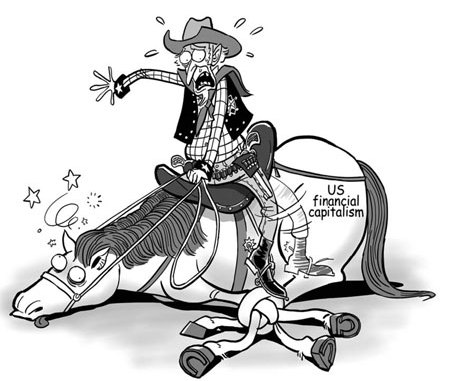By Liu Junhong
The world's financial markets face an uncertain and possibly volatile week as investors await details about how the Treasury will implement the government's financial rescue package - and watch for any further fallout from the credit crisis around the globe.
Even though the perfect storm on the New York financial market has come down for the moment, the fact that Washington took such heavy-handed measures regardless of how the market would take it signals the US version of "financial capitalism" is entering an era of undoing its mistakes.
The US has always prided itself as a cowboy who has lived on financial horsebacks, especially since World War II. It has long been in control of the international monetary and financial system, which has helped it rake in enormous riches, indulge in hegemony and maintain economic prosperity.

Since the end of the Cold War, however, the US-dominated international financial order has experienced a series of crises as its flaws manifested. And since the "black Monday" in October 1987, the world has seen a financial crisis of widespread impact almost every 10 years. The subprime crisis can be seen as the latest example.
Alan Greenspan handled a dozen financial emergencies of various descriptions throughout his 19 years as Federal Reserve (Fed) chairman between August 1987 and January 2006, including such significant events as the yen-dollar exchange rate flipping of 1995, the market-rocking effect of the launch of the euro in 1999 and joint intervention of the euro exchange rate by the European Union (EU), the US and Japan in 2000. All these demonstrated the shakiness of the US-dominated international financial order in the post-Cold War era.
As a matter of fact, the current US financial crisis has once again exposed the flaws of the US version of financial capitalism.
First, the US-led capital game has reached its own limit. Financial liberalism has gone wild since the Thatcher cabinet of Great Britain and the Reagan administration of the US set off a wave of "neo-liberalism" in the 1980s. In 1999 the US adopted the new banking law to further ease financial regulation. As a result the sector-specific management of financial operations was broken and mixed-service operations became the name of the game. Known as "financial operations by arbitration", the format allows businesses to gain huge profits by distorting prices so that they can buy low and sell high in the capital game.
As more players entered the market, the game became less and less profitable as the price system stabilized gradually. In order to expand the room for making profits, major American and European financial institutions threw themselves into "financial technology innovations" to develop financial derivatives and establish a man-made "virtual financial world".
Take the subprime mortgage credits for example. They were integrated, split and repackaged into a series of securities-like commodities, which were then sold throughout the world as new virtual financial products after being split and repackaged again and again by downstream retailers. The US lauded this process as the best way to dilute financial risks as well as financial globalization and liberalization.
The problem is that financial risks, like computer viruses, do not expire as they spread out. As people have found out by now, through repeatedly reselling the debt derivatives, the financial industry spread the "viruses" all over the world. And the whole system would be infected sooner or later once a "virus" developed into a full-blown epidemic. That's why the subprime crisis has been deepening and spreading since it broke out last year.